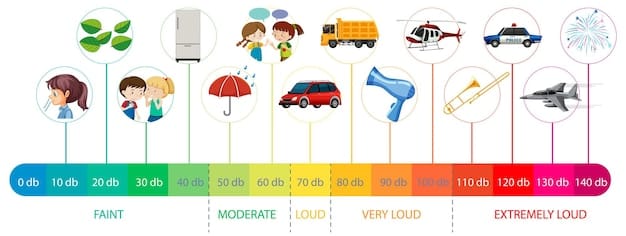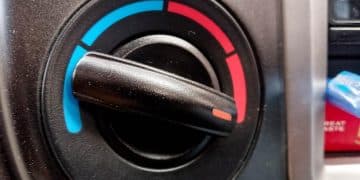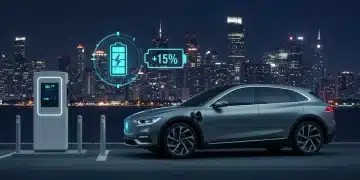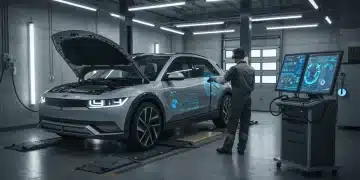Electric Vehicle Performance: How Weather Impacts Range and Battery Life

Recent tests reveal that extreme temperatures significantly affect electric vehicle (EV) performance, reducing range and impacting battery lifespan, highlighting the need for advanced thermal management systems.
Electric vehicles (EVs) are becoming increasingly popular, but how do they perform in extreme weather conditions? Recent tests shed light on the impact of cold and heat on **electric vehicle performance in extreme weather: what recent tests reveal about cold and heat impact**, addressing concerns about range, battery life, and overall reliability.
Understanding the Challenges of Extreme Weather on EVs
Extreme weather conditions pose unique challenges for electric vehicles. Unlike gasoline-powered cars, EVs rely on batteries that are sensitive to temperature fluctuations. Both extreme cold and extreme heat can significantly impact battery performance.
How Cold Weather Affects EV Batteries
Cold weather can reduce the chemical reactions within the battery, limiting its ability to provide power. Additionally, EVs use energy to heat the battery pack, further reducing the available energy for driving.
The Impact of Heat on EV Batteries
Heat can degrade battery components, leading to a reduction in overall battery life. High temperatures can also cause the battery management system to limit power output to protect the battery.

These effects are not just theoretical; they have been observed in real-world testing. Several organizations and publications have conducted tests to quantify the impact of extreme weather on EV performance.
In summary, extreme weather presents significant challenges to electric vehicle performance, affecting both range and battery life. Understanding these challenges is crucial for EV owners and potential buyers.
Recent Tests on EV Range in Cold Weather
Numerous studies have explored how cold weather affects the range of electric vehicles. These tests provide valuable insights into the real-world performance of EVs in different climates.
AAA’s Cold Weather EV Range Test
AAA conducted a comprehensive study that found that EVs can lose an average of 41% of their driving range when the temperature drops to 20°F (-7°C). This loss is primarily due to the energy required to heat the cabin and battery.
Recurrent Auto’s Real-World Cold Weather Data
Recurrent Auto, a company that tracks real-world EV performance, analyzed data from thousands of EVs and found similar results. Their data showed that most EVs experience a significant drop in range when temperatures fall below freezing.
- Pre-heating the cabin while plugged in can mitigate some range loss.
- Using seat heaters and steering wheel heaters instead of the cabin heater can conserve energy.
- Parking the EV in a garage can help maintain battery temperature.

These tests highlight the importance of considering cold weather performance when purchasing an EV, especially for those living in colder climates. While EVs are generally efficient in mild temperatures, their range can be significantly reduced in cold weather.
In conclusion, recent tests consistently show that cold weather reduces the range of electric vehicles. Drivers need to be aware of this limitation and take steps to mitigate range loss during colder months.
The Impact of Heat on EV Battery Life and Performance
While cold weather primarily affects EV range, heat can have a more significant impact on battery life and long-term performance. High temperatures can accelerate battery degradation and reduce overall efficiency.
How Heat Degrades EV Batteries
High temperatures can cause the chemical compounds within the battery to break down, leading to a reduction in capacity and performance. This degradation is often irreversible and can shorten the lifespan of the battery.
Studies on Heat-Related Battery Degradation
Several studies have examined the effects of heat on EV battery degradation. These studies have shown that batteries exposed to high temperatures experience faster degradation compared to those kept in cooler environments.
For example, a study by the National Renewable Energy Laboratory (NREL) found that batteries stored at 95°F (35°C) experienced significantly more degradation than those stored at 77°F (25°C).
In short, heat can significantly impact the life and performance of EV batteries. Taking steps to protect the battery from extreme heat is crucial for maintaining its long-term health.
Strategies for Mitigating Weather-Related EV Performance Issues
Despite the challenges posed by extreme weather, there are several strategies that EV owners can use to mitigate performance issues and maintain optimal battery health.
Preconditioning the Battery
Preconditioning involves heating or cooling the battery to its optimal operating temperature before driving. Many modern EVs offer this feature, which can be activated remotely via a smartphone app.
Using Energy-Efficient Driving Techniques
Aggressive driving habits, such as rapid acceleration and hard braking, can consume more energy and generate more heat. Adopting energy-efficient driving techniques can help conserve battery power and reduce heat buildup.
- Drive at a moderate speed to reduce energy consumption.
- Use regenerative braking to recapture energy during deceleration.
- Avoid aggressive acceleration and hard braking.
By employing preconditioning and adopting energy-efficient driving techniques, EV owners can minimize the impact of extreme weather on their vehicle’s performance. These strategies can help maintain optimal range and extend battery life.
In conclusion, while extreme weather can affect EV performance, there are several effective strategies that owners can use to mitigate these issues. These strategies can help maintain optimal range and extend battery life.
Advancements in EV Battery Thermal Management Systems
One of the most promising areas of development in the EV industry is battery thermal management. Advanced thermal management systems are designed to keep the battery at its optimal operating temperature, regardless of external conditions.
Liquid Cooling Systems
Liquid cooling systems circulate a coolant fluid through the battery pack to dissipate heat. These systems are highly effective at maintaining a consistent battery temperature, even in extreme conditions.
Heat Pumps
Heat pumps can transfer heat from the cabin to the battery or vice versa, depending on the temperature. This technology can help maintain optimal battery temperature while reducing energy consumption.
Insulated Battery Packs
Insulated battery packs are designed to minimize heat loss in cold weather and prevent heat buildup in hot weather. This insulation helps maintain a stable battery temperature and improve overall efficiency.
These advancements in battery thermal management are helping to improve the performance and reliability of EVs in extreme weather conditions. As technology continues to evolve, we can expect to see even more sophisticated thermal management systems in future EVs.
In summary, advancements in battery thermal management systems are crucial for improving EV performance in extreme weather. These systems help maintain optimal battery temperature and enhance overall efficiency.
Future Trends in EV Weather Resilience
The future of electric vehicles includes a focus on improving their resilience to extreme weather conditions. Innovations in battery technology, thermal management, and vehicle design are expected to play a key role.
Solid-State Batteries
Solid-state batteries are more resistant to temperature fluctuations and offer higher energy density. These batteries could significantly improve EV performance in extreme weather.
Improved Thermal Insulation
Advanced thermal insulation materials can help maintain a stable battery temperature, reducing energy consumption and improving range in cold weather.
Smart Climate Control Systems
Smart climate control systems can learn driving habits and adjust the cabin temperature accordingly, optimizing energy efficiency and driver comfort.
These developments promise to make EVs more reliable and efficient in all weather conditions. As the technology matures, we can expect to see a new generation of EVs that are better equipped to handle the challenges of extreme weather.
In conclusion, the future of electric vehicles includes a strong focus on improving their resilience to extreme weather conditions. Innovations in battery technology, thermal management, and vehicle design are expected to play a key role.
| Key Point | Brief Description |
|---|---|
| ❄️ Cold Weather Impact | Range can decrease by up to 41% due to battery inefficiency and heating needs. |
| 🔥 Heat Effects | High temperatures can degrade battery components, reducing lifespan and performance. |
| 🛡️ Mitigation Strategies | Preconditioning, efficient driving, and garage parking can help maintain battery health. |
| 🔋 Thermal Management Systems | Advanced systems like liquid cooling and heat pumps optimize battery temperature. |
Frequently Asked Questions
▼
Cold weather reduces the chemical reactions in the battery and increases energy consumption for heating, leading to a significant decrease in driving range.
▼
Yes, prolonged exposure to high temperatures can degrade battery components, leading to reduced capacity and a shorter lifespan. Effective thermal management is crucial.
▼
Battery preconditioning involves heating or cooling the battery to its optimal temperature before driving, which helps maintain range and efficiency in extreme weather.
▼
Preheat the cabin while plugged in, use seat and steering wheel heaters, park in a garage, and adopt energy-efficient driving habits to conserve battery power.
▼
Future trends include solid-state batteries, improved thermal insulation, and smart climate control systems, all aimed at enhancing EV performance and reliability in various climates.
Conclusion
Understanding the impact of extreme weather on electric vehicle performance is crucial for both current and prospective EV owners. While cold and heat can present challenges, advancements in technology and strategic driving habits can help mitigate these effects, ensuring a more reliable and efficient EV experience.





